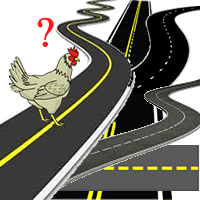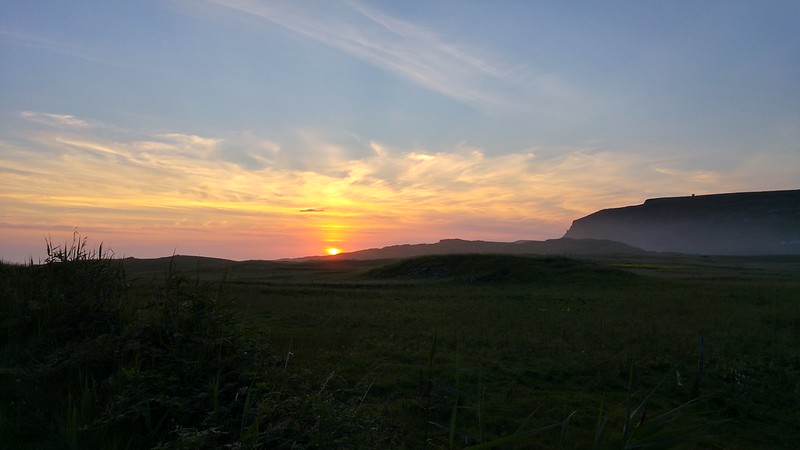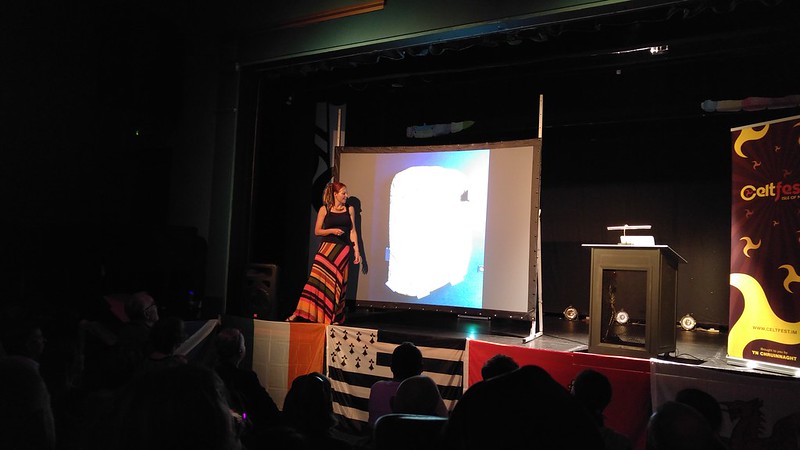Last week I learned that there are quite a few words for roads in Irish. These include:
bóthar [ˈbˠoːhəɾˠ] = road; way, manner. From the Proto-Celtic *bow-itros (cow path).
Related words in other Celtic languages:
– bóthar [boː.ər] = alley, lane (Scottish Gaelic)
– bayr [bajr] = avenue, drive, lane, pad, roadway (Manx)
– beidr [beidɪr] = lane, track (Welsh)
– bownder [‘bɔʊndɛr] = lane (Cornish)
bóithrín = country lane, boreen (diminutive of bóthar)
bealach [ˈbʲalˠəx] = way, road track; pass. From the Old Irish belach (gap, pass, road, path).
Related words in other Celtic languages:
– bealach [bjal̪ˠəx] = pass; access; detour; breach, gap, opening; inlet (Scottish Gaelic)
– bollagh = channel, course, curving uphill road, gap, gorge, lane, passage, route, thoroughfare (Manx)
ród [rˠoːdˠ] = road, highway. From the Old Irish rót (road, highway).
Related words in other Celtic languages:
– rathad [ra.ad] = road, way, route (Scottish Gaelic)
– raad [reːd̪, raːd̪] = avenue, drive, lane, pad, roadway (Manx)
– rhawd [r̥aud] = course, career (Welsh)
– roud = route, trace (Breton)
slí [ʃliː] = way, road, track, route, passage. From the Old Irish slige (gap, pass, road, path).
Related words in other Celtic languages:
– slighe [ʃl̪ʲi.ə] = path, track, trail, way; course, passage, route (Scottish Gaelic)
cosán = path; footway, track; way, passage; direction. From the Old Irish casán (path, footpath), from cás (foot).
Related words in other Celtic languages:
– casan [kasan] = path; supporting beam; treadle; wattle (Scottish Gaelic)
– cassan [keːzən] = passage, path, pathway, sidewalk, thoroughfare; walk, footpath; trajectory (Manx)
cabhsa = causeway; path, lane
sráid [sˠɾˠɑːdʲ] = street; level (surfaced) ground around house; village. From the Old Irish sráit (street, road, path, way), from the Old Norse stræti (street), from Late Latin strāta (a paved road).
Related words in other Celtic languages:
– sràid [sdraːdʲ] = street (Scottish Gaelic)
– straid = street; farmyard; thoroughfare (Manx)
– stryd [striːd] = street (Welsh)
– stret [strɛ:t] = street (Cornish)
– straed = alley, lane (Breton)
Incidentally, the English word road comes from the Middle English rode/rade, from the Old English rād (riding, hostile incursion), from the Proto-Germanic *raidō (a ride), from the Proto-Indo-European *reydʰ- (to ride).
Sources: teanglann.ie, Wiktionary, Fockleyreen, Am Faclair Beag, Dictionnaire Favereau breton, cornish dictionary / gerlyver kernewek




